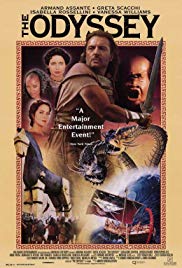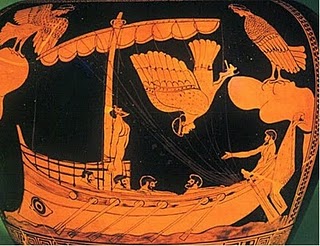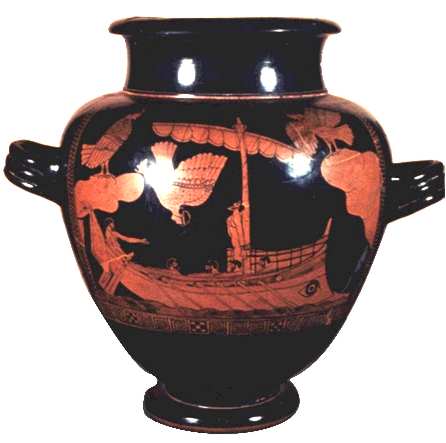1. See Discussion Questions for Use With any Film that is a Work of Fiction.
[No suggested Answers.]
2. It has been said that the genius of Odysseus lies in his intelligence to quickly assess any situation and his ability to select the best course. He also has the strength and resourcefulness to act on his ideas. Is this wisdom?
Suggested Response:
No. Being a clever tactician is important, especially in a warrior. It is not wisdom. A wiser man than Odysseus would not have given in to hubris and would not have angered the gods. While Odysseus was a clever man and this was one part of his intelligence, he has many more virtues, such as his allegiance to home and family, his fidelity (in the way of the ancients) to his wife, his ability to tell tales, and his ability to restrain his appetites.
3. In this story, what was Odysseus’ most grievous loss?
Suggested Response:
The loss of 20 years, the prime of their lives, with his wife and the fact that he was not with his son while the boy was growing up. To a lesser extent, his tragedy is the loss of his men.
4. Why is Odysseus a hero?
Suggested Response:
There is no one correct response. A good response would include some the following concepts: Because he triumphs, not over a person, but over adversity, because he perseveres, because he recognizes who he is despite temptations to become immortal or to marry a young girl, because he is able to restrain himself (with notable exceptions), because he survives due to his wits and because his weaknesses (e.g., pride, difficulty in seeing the faults of his companions) are so human.
5. What is Athena to Odysseus?
Suggested Response:
There is no one correct response. A good response would include some of the following concepts: Athena is the god who loves Odysseus the most. She intervenes on his behalf and counsels him. When he performs miracles in battle, he feels her presence beside him, battling along with him. She tells him: “Two of a kind we are, contrivers both…. I am always with you in times of trial, a shield to you in battle, ….” Book XIII lines 379 & 380. In mythology, no god and man are soul mates like Athena and Odysseus. But on a deeper level, Athena represents Odysseus’ rationality, patience and understanding. She embodies the strength and resilience of Odysseus’ human spirit which works, perhaps in his unconscious, even through the seven years of suspended animation with Calypso.
6. What are the differences between the Judeo/Christian/Muslim concept of God and the gods of the ancients as shown in The Odyssey?
Suggested Response:
There is no one correct response, and it is beyond the scope of a Learning Guide to sum up religions, but a good response would include some of the following concepts: The ancient gods required obedience, recognition of their power over man, and recognition of the obligations of family and hospitality. The gods of the ancients had attributes of nature (wind, the sea, earthquakes, thunderbolts) or attributes of society or of men (war, technology, art, love). The gods of the ancients could feel sexual attraction, friendship, hatred and could argue in a petty way. The Judeo/Christian/Muslim God is sole (there is only one God) and also requires obedience, but these religions focus on recognition of God’s glory and, in addition, impose a moral code of conduct much stricter than simply a focus on family and hospitality. (This answer is limited to ancient Greek religion as described in The Odyssey. A full study of the religion of the ancients is beyond the scope of this Learning Guide.)
7. What was the ancient Greek view of death shown in The Odyssey? Does the world of the dead seem to be a good place?
Suggested Response:
The soul or shade of a person is represented as a gibbering insubstantial being that lives in eternal regret at the loss of its body and of the substantive nature of life. If the person died unfulfilled, that lack of fulfillment persists in the shade. Hades is not a happy place but it is not a place of torture like the Christian hell. The shades regret their deaths and constantly feel the need to become corporeal again. (This answer is limited to the view of death shown in The Odyssey. A full study of the religion of the ancients is beyond the scope of this Learning Guide.)
8. Why does an ancient story such as The Odyssey interest modern audiences?
Suggested Response:
It deals with issues that are basic to mankind, which we are still attempting to resolve today. Examples are: the struggle to get what we need against forces that are stronger than we are (every man or woman has his own odyssey); the love of home; the necessity of restraint; how to be a good leader or a good follower; the importance of using our minds and trying to think of ways to get out of bad situations; the struggle between sensuality (Calypso) and mature love (Penelope).
9. The society of The Odyssey is very much like our own, despite being set in a different continent thousands of years ago. The story illustrates many of our own concerns, foibles, strengths and weaknesses. What does this tell you about human nature and great literature?
Suggested Response:
See response to the preceding question.
10. Describe the differences between the society set out in The Odyssey and modern post-industrial society.
Suggested Response:
There are many differences, among them, urban vs. rural, agrarian vs. industrial, democracy vs. monarchy. There are also differences in the attitude toward hospitality and the attitude toward sexual fidelity, both male and female.
11. Describe the main female characters in The Odyssey. Who are they? How are they portrayed? Is there any difference between the human female characters and the divine female characters of the fantasy world of Odysseus’ journey?
Suggested Response:
See discussion in the Helpful Background Section.
12. What was Odysseus doing on Calypso’s island for seven years?
Suggested Response:
There is no one right answer. A good answer would include the following: Odysseus was bewitched by Calypso; Odysseus was mourning for his inability to return to Ithaca and Penelope and for his men and working through (in a psychological sense) all that had happened to him.
13. In the world of The Odyssey, what crimes are consistently punished?
Suggested Response:
Two, the first is hubris and the second is abuse of the code of hospitality, either the failure to be hospitable to strangers or a guest’s abuse of hospitality.
14. There are still many cultures in the world today and in the recent past which have valued hospitality in a way similar to the ancient Greeks. However, modern Western culture does not hold hospitality in such high regard. Would you make your home available to a homeless person who came in off the street? Would you criticize someone who did not? Would you wonder about the sanity of someone who did? If the attitude toward hospitality has changed, why and how did it change?
Suggested Response:
Certainly, modern society views hospitality differently than the ancients. In ancient society it was a cardinal sin to deny shelter to a stranger. It is no longer an overriding moral imperative to be hospitable to strangers. In fact, we would question the judgment, or even the sanity, of someone who threw the doors of their home open to strangers. Strangers in need are cared for by governmental and charitable organizations which specialize in caring for the needy. Most people view their role as contributing either time or money to such organizations. We do not know the reason for the change. Perhaps it’s because society has become more complex. Maybe the availability of lodging in hotels and inns has removed the necessity for hospitality. Perhaps it’s because modern day life is too busy and too pressured for person to person hospitality. Perhaps it’s a breakdown of standards over time.
15. What role does revenge play in The Odyssey? Is this consistent with the modern view of revenge?
Suggested Response:
Actually, revenge is not a real issue in The Odyssey. Odysseus’ right to kill the suitors is taken for granted. This is probably because elimination of the suitors is essential for other beneficial reasons, specifically, to reestablish order in Ithaca. However, Odysseus’ revenge on the suitors is never questioned from a moral standpoint. The modern view of revenge is described by Shakespeare in Hamlet and Romeo and Juliet or West Side Story. In modern Western society, revenge is reserved for the state and violent revenge is punished as a crime.
16. What does the term “hero” mean to you? Is this the same as the ancient Greek concept? Was Odysseus a hero? If you think he was, describe his heroic qualities. If you think he wasn’t, contrast his experience and attributes with those of characters who were heroes.
Suggested Response:
The modern view of a hero is someone who does something great or wonderful, usually through actions which benefit others or society as a whole. Often it means sacrificing oneself for others. Greek heros included Achilles (the strongest warrior, the most skilled in the use of weapons) and Odysseus (the best tactician). But Odysseus was more than merely a clever warrior and charming diplomat. He was a man who, above all, knew who he was and who persevered against all odds and all temptations to attain his goal of returning home. Odysseus is especially dear to our hearts because his goal was simply to get home, something we all can understand.
17. What is the attitude of The Odyssey toward the sea?
Suggested Response:
The sea is dangerous and keeps sailors (Odysseus chief among them) away from their homes. Odysseus is frequently tested by dangerous sea voyages. The hostility of the sea is reflected in the fact that Poseidon, god of the sea, is angry at Odysseus. Poseidon’s son, Polythemos, is a threat to Odysseus and eats several of his men. The ability to cross the sea easily, possessed for example by the Phaeacians, is seen as magical. In contrast, the land is seen as hospitable.
18. What does the term “beware of Greeks bearing gifts” mean and how does it relate to Odysseus?
Suggested Response:
The term means that if someone is in an adversarial position to you (such as a competitor for a job or for the affections of someone) and suddenly they give you a gift or appear to do something for your benefit, you should be very careful. It refers to the Trojan Horse (Odysseus’ idea) which appeared to be a gift by the Greeks to the Trojans.
19. What does the term “a Trojan Horse” mean?
Suggested Response:
a subversive group or device placed within enemy ranks. Source: American Heritage Dictionary, Third Edition.
20. Is The Odyssey a tragedy?
Suggested Response:
No. Odysseus, the hero of the tale, reaches his destination and reclaims his home, although with great losses. It is, instead, an epic.
21. Most societies celebrate stories involving a journey. Give some examples other than The Odyssey. What is the attraction of these stories?
Suggested Response:
The biblical story of the journey of the Jews from Egypt to Canaan; the journey of many Americans from the East to the Western frontier; The Wizard of Oz. For children, the myth of the journey deals with the fear that they will be separated from their home and family. As they mature, they observe in their lives people leaving and returning, for war, for adventure, for business, to fulfill their dreams. There is always a tension about whether the journey will be successful, will the person who takes the journey be the same when they return as when they left, will the people who remained at home be faithful, will the person who takes the journey return home or find a better life and stay where they journeyed to. In this way, the myth of the journey, whether there is a return or not, has a fascination for all ages.
22. Between the Trojan War and his travels, Odysseus was gone from home for twenty years. Imagine that you were separated (with no contact) from your loved ones, all family, boyfriends or girlfriends, for twenty years. What would it be like to be reunited with them? How would things have changed? How would you feel?
Suggested Response:
There is no one correct response. A good response would include some of the following concepts: There would be joy at the return but each group would have changed and developed during the time away and whether the reunion is successful will depend upon the strength of the bond in the first place, whether the changes of the individuals over time and because of their different experiences were compatible with each other; and whether new bonds could be formed by the individuals due to their new life together. Reunions between soldiers coming home from war and family that stayed behind are often fraught with difficulty because the soldiers have had new and different experiences, many of them very intense.
23. Elpenor was the youngest and least accomplished of Odysseus’ companions. He fell from Circe’s roof while drunk and broke his neck. Odysseus met Elpenor’s shade in Hades and promised to give his body a proper burial when Odysseus returned to Circe’s island. What is the significance of this promise?
Suggested Response:
Elpenor is not a hero. He dies, not in battle, not in a dangerous enterprise, but when he is at leisure. He is inattentive, slips and falls. An accidental death is much more likely for most of us than a hero’s death in battle. The meaning is that even the least of us deserve respect.




